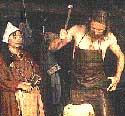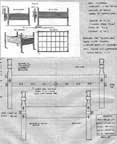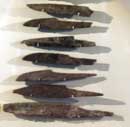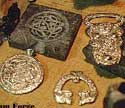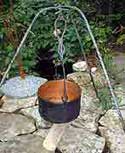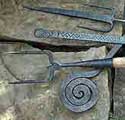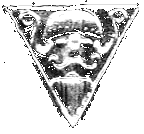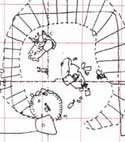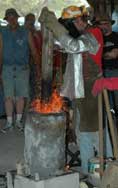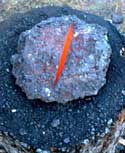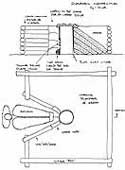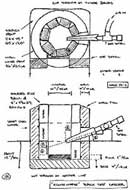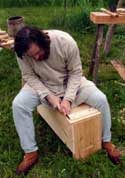
Under Preparation
From it's original inception in fall of 1992, the Norse Encampment was intended to be a professional level program. For this reason, a defining 'Mission Statement' was one of the first tasks undertaken. As the program has developed, this Mission Statement has helped to keep the processes and objectives of the program clear.
This academic paper was written in early 1998 about various aspects of the Interpretive program developed for L' Anse aux Meadows NHS. The version available here was given at the 27th Annual Association for Living Historical Farms & Agricultural Museums (ALHFAM) Conference at University of Waterloo. This version deals with more of the practical aspects of the creation and operation of the Viking Encampment program.
The impact of the Norse Encampment owes a great deal to the collection of detailed reproductions that surround the interpretive staff. Producing detailed copies of early period artifacts involves both research and craftsmanship. This segment details the approaches and problems of the process.
by Birgitta Wallace
A duplicate of an article originally published on the web stite of the Bever.
The impact of the Norse Encampment owes a great deal to the collection of detailed reproductions that surround the interpretive staff. Producing detailed copies of early period artifacts involves both research and craftsmanship. This segment details the approaches and problems of the process.
This is a draft version of an ongoing research project to gather together artifact evidence from a number of sources into an overview of knives from the Viking Age. Although not a finished report, it may prove interesting to re-enactors and bladesmiths.
There are a growing number of short videos available which document
primarily two aspects of the ongoing work related to the Norse Encampment
program:
The series listed here are demonstrations of physical techniques, primarily
related to the production of various replica and reproduction objects
used in the program.
The Wareham Forge was started because of an interest in creating working replicas of Viking Age objects. Over the years, a large number of detailed replicas have been produced for both museum exhibits and living history programs. This has included objects for serious re-enactors - even feature films. This gallery style overview features a number of these replicas with commentaries on historic sources, technical methods and general observations.

This is a very brief overview of the Norse of the Viking Age, prepared to act as a guide for Elementary level teachers (1993). Although very general in nature (!) it does cover the main topic areas : daily life, ships and travel, trade and warfare, religion.

This academic paper was written in early 1998 about various aspects of the Interpretive program developed for L' Anse aux Meadows NHS. The version available here was given at the 27th Annual Association for Living Historical Farms & Agricultural Museums (ALHFAM) Conference at University of Waterloo. This version deals with more of the practical aspects of the creation and operation of the Viking Encampment program.
This is a draft version (2007) of an ongoing research project to gather together artifact evidence from a number of sources into an overview of knives from the Viking Age. Although not a finished report, it may prove interesting to re-enactors and bladesmiths.
An overview of experimental iron smelts, 2001 - 2008.
Friends of the Medieval Studies Society of the Royal Ontario Museum
1st Annual Symposium
March 2006.
Revised for publication, December 2008.
" This paper outlines the experiments ... undertaken to date, the
results and lessons learned, and discusses some insights that may be of
interest to the larger community of researchers."
Presented at 'Forward Into the Past', Wilfred Laurier University, April, 2010
The full text of the revised version (V3 - June 2010) available as a PDF.
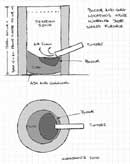
Towards an effective method for small iron smelting furnaces.
" This essay will concentrate on describing a proven working system,
based on Migration Era models, which has repeatedly produced historic
type iron blooms. "
An article prepared for the journal EuroREA, scheduled for publication in the Spring 2011 issue.
Full Documentation
This is the separate section documenting the experiments conducted since 2001, including research, field reports, photographs & video.
An overview of experimental iron smelts, 2001 - 2005.
Friends of the Medieval Studies Society of the Royal Ontario Museum
1st Annual Symposium
March 2006.
" This paper outlines the experiments ... undertaken to date, the results and lessons learned, and discusses some insights that may be of interest to the larger community of researchers."
This is a revised version of the original paper, prepared for potential publication in December 2008. It covers the results from 39 experiments (the original version only 13), yet at the same time was reduced in length about 50%!
Presented at 'Forward Into the Past', Wilfred Laurier University, April, 2010
The full text of the revised version of this formal paper (V3 - June 2010) available as a PDF.

Towards an effective method for small iron smelting furnaces.
" This essay will concentrate on describing a proven working system,
based on Migration Era models, which has repeatedly produced historic
type iron blooms. "
An article prepared for the journal EuroREA, scheduled for publication in the Spring 2011 issue.
Originally published on the blog 'Hammered Out Bits' this short article has a more formal structure (footnotes and references).
Prepared with the assistance of Kevin Smith & Neil Peterson
This is an 'in house' document outlining the archaeology and thought behind the Icelandic / Sod Smelter series started in 2007
The EconoNorse small test smelter takes its rough size and general operating characteristics from a blend of Viking Age archaeology and modern practical experience. It has simple construction and is made of easy to gather materials. The rough form was developed in Fall of 2004 by members of the Dark Ages Re-Creation Company, with further refinements made in February of 2005 with guidance from Sauder / Williams / McCarthy.
There are a growing number of short videos available which document
primarily two aspects of the ongoing work related to the Norse Encampment
program:
The series listed here are segments documenting individual experimental
iron smelting experiments undertaken by members of the Dark Ages Re-creation
Company.
" The Dark Ages Re-creation Company seeks to create an environment that stresses historic re-creation of the Viking Age through the use of strict interpretation at a 'role playing' level and authenticity guidelines regulated by peer review. The Company intends to provide a resource of skilled and experienced historic interpreters and physical demonstrators to museums and educational programs. "
off the Encampment series
This link will take you to the separate DARC web site. Here the Company records its ongoing experimental archaeology projects (textiles, glass bead making, iron smelting) plus research in many areas. There is also a photo record of past musuem presentations. Information is available on our interpretive stance and demonstration methods.
Over the years, a wide range of historic objects have been created by the Wareham Forge. The objects shown in this gallery of past work mark a number of differing time periods, and include both forge work and sheet forming techniques.
The Wareham Forge produces a number of replicas of specific artifact cookware items. This includes several different pots and cauldrons in both steel, copper and brass
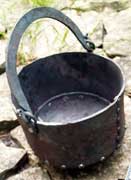
Under Preparation
The Wareham Forge produces layered steel blades using both the 'Damascus' (flat stack) and 'Pattern Weld' (twisted cores) methods. Primarily undertaken as custom commissions, past work has included a wide range of styles and sizes - from replica Norse carving knives through to fantasy great swords.
Sea Chest Hinges, Ship Rivets, small Knives...
Replica solid sterling silver coins, struck by hand using coin dies
reproducing those found in York, England circa 950 AD!
The page also provides some information on coins and coinage during the
Viking Age.
A modern version of the Norse game from the Wareham Forge.
How were the rules developed? Details how individual source artifacts served as the starting point to develop the graphic design for this modern version of an ancient game.
Introduction to Iron Smelting : is a two day program at the Wareham Forge. For more details - go to the full description.
Archaeology & Experiment - Iron Smelting : is a three to four day program held at an institution. For more details - go to the full description.




